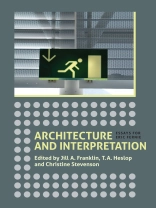Essays centred on the methods, pleasures, and pitfalls of architectural interpretation.
Architecture affects us on a number of levels. It can control our movements, change our experience of our own scale, create a particular sense of place, focus memory, and act as a statement of power and taste, to name but a few. Yet the ways in which these effects are brought about are not yet well understood. The aim of this book is to move the discussion forward, to encourage and broaden debate about the ways in which architecture is interpreted, with aview to raising levels of intellectual engagement with the issues in terms of the theory and practice of architectural history. The range of material covered extends from houses constructed from mammoth bones around 15, 000 years ago in the present-day Ukraine to a surfer’s memorial in Carpinteria, California; other subjects include the young Michelangelo seeking to transcend genre boundaries; medieval masons’ tombs; and the mythographies of early modern Netherlandish towns.
Taking as their point of departure the ways in which architecture has been, is, and can be written about and otherwise represented, the editors’ substantial Introduction provides an historiographical framework for, and draws out the themes and ideas presented in, the individual contributors’ essays.
Contributors: Christine Stevenson, T. A. Heslop, John Mitchell, Malcolm Thurlby, Richard Fawcett, Jill A. Franklin, Stephen Heywood, Roger Stalley, Veronica Sekules, John Onians, Frank Woodman, Paul Crossley, David Hemsoll, Kerry Downes, Richard Plant, Jenifer Ní Ghrádraigh, Lindy Grant, Elisabeth de Bièvre, Stefan Muthesius, Robert Hillenbrand, Andrew M. Shanken, Peter Guillery.
Tabla de materias
Introduction – T A Heslop and Christine Stevenson
Believing is Seeing: the natural image in late antiquity – John Mitchell
Articulation as an expression of function in Romanesque architecture – Malcolm Thurlby
Barrel-vaulted churches in late medieval Scotland – Richard Fawcett
Augustinian and other canons’ churches in Romanesque Europe: the significance of the aisleless cruciform plan – Jill A. Franklin
Towers and radiating chapels in Romanesque architectural iconography – Stephen Heywood
Diffusion, imitation and evolution: the uncertain origins of ‘beakhead’ ornament – Roger Stalley
Architecture and pattern: the western façade of Lincoln Cathedral and Modernist reference points for its interpretation – Veronica Sekules
Home sweet mammoth: neuroarchaeology and the origins of architecture – John Onians
Constantine and Helena: the Roman in English Romanesque – T A Heslop
For their monuments, look about you: medieval masons and their tombs – Francis Woodman
Baxandall’s bridge and Charles IV’s Prague: an exercise in architectural intention – Paul Crossley
Imitation as a creative vehicle in Michelangelo’s art and architecture – David Hemsoll
The ‘façade problem’ in Roman Churches c.1540-1640 – Kerry Downes
Innovation and traditionalism in writings on English Romanesque – Richard Plant
Why medieval Ireland failed to edify – Jenifer Ni Ghradaigh
The Chapel of the Hospital of St-Jean at Angers:
acta, statutes, architecture and interpretation – Lindy Grant
Sealed architecture: city seals, architecture and urban identity in the Northern Netherlands, 1200-1700 – Elisabeth de Bievre
Style and geography: struggles for identification in the later nineteenth century – Stefan Muthesius
The Dome of the Rock: from medieval symbol to modern propaganda –
Towards a cultural geography of modern memorials – Andrew Shanken
Bicycle sheds revisited, or: why are houses interesting? – Peter Guillery












